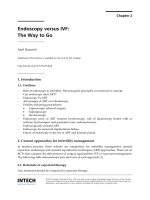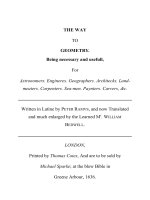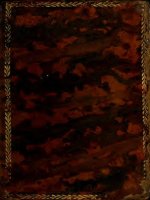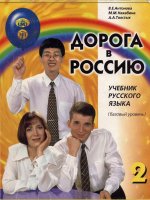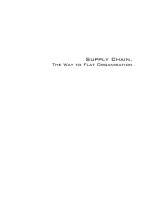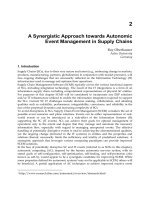The way to wealth
Bạn đang xem bản rút gọn của tài liệu. Xem và tải ngay bản đầy đủ của tài liệu tại đây (5.46 MB, 204 trang )
^^J5
.
r
-
^
"a^
iTHE
WAY
TO WEALTH.
DIJON
Printed
bv
P.
Causae.THE
WAY
TO
WEALTH
OR
POOR
PelCHARD
IMPROVED
BY
EENJ. PPuANKLIN.
PARIS,
Printed
for
Ant. Aug.
Renouabx),
Apolline's
street, n°. sS.
M.
DCC. XCV.
Franklin for
many-
years published the Peiisyl-
vania almanack,
called
poor
Richard
Saunders
,
and fur-
nished
it A^ith
various sen-
tences
and
proverbs, which
had
principal
relation
to
the
topics
of industry
, at-
tention
to
one's
own Imsi-
ness ,
and frugality.
The
whole or chief
of these
sen-
tences and
proverbs ,
he
at
last
collected
and
disiested
in
the
present small
Avork,
which his countrymen
read
1
with
mucli
avlJity
and pro-
fit
,
and
which will
be ,
I
hope,
kindly received by
mine in this
small
elegant
volume
, as
much
as
it
has
never been printed
in
Fran-
ce into
its
original
tongue.
THE
WAY
TO
V/EALTH.
Cjou
RTEOUS READER
y
I Iiave lieard
,
tliat
notliliig
gives
an
author
so
great pleasure
,
as to
find
his works
respectfully
quoted
by others.
Judge
,
then
,
how
much
I must
have
been gratified
by
an
incident
I
am
going
to relate
to
you.
I
stopped my
horse
lately
,
where a
great
number of
people
were
collected
,
at an auction
of
merchants
goods. The
hour
of \\\q
sale not
being
come
,
they
were
conversing
on the badness
of the
4
THE
W
A
Y
times
5
and one
of the company cal-
led
to a
plain
,
clean
old man
,
with
white
locks :
Pray
,
father
Abra-
ham
,
what
think you
of
the
times?
Will
not these
heavy
taxes
quite
ruin
the
country
? How shall
we
ever
be
able
to pay them
? What
would
you
advise us to ?
Father
Abraham
stood
up
,
and
replied
:
if you
would
have my advice
,
I
will
give
it
you
in short
5
for
a
word
to
the
wise is
enough
,
as
poor
Richard
says.
They
joined in desi-
ring
him
to
speak his
mind
,
and
gathering
round
him
,
he proceed-
ed
as
follows
:
Friends
,
says
he
,
the taxes are
,
indeed
, very
heavy
,
and
,
if
those
laid
on by
the
government
were
the
TO
WEALTH.
5
only ones
we
had
to pay
,
we
might
more
easily discharge
them
5
but
we
have many others
,
and
much
more
grievous to some of us. We
are
taxed
twice
as
much by our
id-
leness
,
three
times
as much by our
pride , and
four times
as
much by
our folly
5
and from
these taxes
the
commissibnners cannot ease or
de-
liver us , by allowing
an abatement.
However
,
let us
hearken to good
advice, and something
may
be
done
for
us
5
God
helps them
that
help
themselves, as poor
Richard
says.
I. It would
be thought
a hard
go-
vernment
that
should
tax
its
people
one
tenth
part of
their
time
, to be
employed
in
its
service
: but idle-
ness taxes
many
of
us
much
more
5
6
T
H
E
W
A
Y
sloth
,
by bringing
on diseases
,
absolutely
shortens life. Sloth, like
rust
,
consumes
faster
than labour
wears
,
while
the
used
key
is
al-
ways
bright , as
poor
Richard
says.
But
dost thou
love life
,
then do
not squander time
,
for that is
the
stuff life is made of, as
poor Ri-
chard says. How much more
than
is necessary do
we
spend in
sleep !
forgetting
that
,
the sleeping fox
catches
no poultry
,
and
that there
will be
sleeping
enough
in
the
gra-
ve
,
as
poor
Richard
says.
If
time
be of
all things
the
most
precious
,
wasting time must be
,
as
poor
Richard
says
,
the greatest
prodigality
J
since,
as
he
elsewhere
tells us
J
lost time is
never
found
TO WEALTH.
7
again
;
and
what
we
call time
e-
nough
J
always
proves
little
enough
:
let
us
then
up and be doing
,
and
doing to
the
purpose
5
so
by
dili-
gence shall we
do
more
with
less
perplexity. Sloth makes all things
difficult
,
but industry all easy
5
and
, he that
riseth late
,
must trot
all
day
,
and shall
scarce overtake
his
business
at
night
5
while
laziness
travels
so slowly,
that
poverty
soon
overtakes
him.
Drive
thy
business,
let not
that drive
thee
5
and early to
bed, and
early to rise
,
makes
a
man
healthy
,
wealthy
,
and
wise
,
as poor
Richard says.
So
what
signifies
wishing
and
hoping
for better
times?
We
may
make
these
times
better ,
if
we
bes-
8
T H
E
WAY
tir ourselves. Industry
need not
wish
J
and
he
that lives upon
hope
will die
fasting.
There
are no gains
without
pains
5
then
help hands
,
for
I have
no lands
,
or
,
if I
have
,
they are smartly
taxed. He
that hath
a
trade ,
hath an estate
;
and he that
hath
a
calling
,
hath an office of
profit
and honour
, as poor Richard
says
;
but then the trade must be
worked at , and the
calling well
followed
,
or neither
the
estate nor
the office will enable us to
pay our
taxes.
If
we
are industrious
,
we
shall
never starve
;
for
, at
the work-
ing
man's
house
hunger
looks
in
,
but
dares
not enter. Nor will
the
bailiff
or
the constable
enter
,
for
industry
pays
debts
,
while
despair
TO
WEALTH.
9
increaseth
them.
What
though
you
have
found no
treasure
,
nor
has
any
rich relation
left
you
a
legacy
9
diligence
is the
mother
of good luck
and
God
gives
all
things to indus-
try.
Then plow
deep
,
while slug-
gards
sleep,
and
you
shall
have corn
to
sell and
to keep.
Work
while it
is
called to-day
,
for
you know
not
how
much
you
may
be hindered to-
morrow. One to-day is worth
two
to-morrows
,
as poor Richard
says
5
and farther
; never leave that till
to-morrow
,
which you
can do to-
day.
If
you
were
a servant
,
would
you
not
be
ashamed
that
a
good
master
should
catch you
idle
? Are
you
then
your
own
master
? be
as-
2
lO
THE
WAY
liamed to
catch yourself idle
,
when
there
is
so much to be
done for
your-
self
,
your
family
,
your
country
,
and
your king.
Handle your
tools
without
mittens
,
remember
,
that
the
cat in gloves catches no mice
,
as
poor Richard
says.
It is true
,
there is
much to
be done
,
and
,
per-
haps
,
you are
weak
handed
5
but
stick
to
it
steadily
,
and
you
will
see
great
effects
5
for
constant
drop-
ping
wears away
stones
5
and by
diligence
and
patience the mouse
ate in two
the
cable
5
and little
strokes
fell great oaks.
Methinks
I hear some
of you say
:
must a
man afford
himself no lei-
sure?
I will tell thee
,
my
friend
,
what
poor Richard
says :
employ
TO WEALTH.
11
thy
time well
,
if thou meanest to
gain leisure
;
and since
thou art
not
sure
of a minute
,
throw
not
away
an
hour.
Leisure is time for
doing something useful
5
this
lei-
sure
the diligent
man
will obtain,
but
the lazy man never
5
for
,
a life
of
leisure and
a
life
of laziness
are
two
things.
Many,
without
labour
,
would
live by
tbeir
wits only
,
but
they break
for
want
of
stock
5
whereas industry
gives
comfort
,
and plenty
,
and
respect. Fly
plea-
sures
,
and they will
follow
you.
The diligent spinner
has
a
large
shift
;
and now
I
have a sheep
and
a cow
,
every
body bids
me good-
morrow.
II.
But
with
our industry,
we
12
THE
WAY
must
likewise
be
steady
,
settled
,
and careful
,
and
oversee
our
own
affairs wdth our
own
eyes
,
and
not
trust too much to
others
5
for
,
as
poor Richard says :
I
never
saw
an oft-removed tree
,
Nor yet
an
oft-removed
family
,
That throve
so well as
those that
set-
tled
be.
And again
:
three removes
is
as
bad
as
a
fire
:
and
again
; keep thy
shop
,
and
thy shop
will
keep
thee
:
and again
:
if
you would
have
your
business
done
,
go ;
if
not
y
send
:
and again
:
He
that by the plough would
thrive
,
Himself must
either hold or drive.
And
again
: the eye
of
a mas-
TO
WEALTH. l3
ter
will do
more
work
than
both
his hands : and again : want
of
care
does us
more
damage than
want
of
knowledge :
and again
:
not
to oversee workmen
,
is
to leave
them
your purse open. Trusting
too
much to
others
care is the ruin
of
many
:
for
,
in
the affairs of this
world
,
men
are
saved
,
not by
faith
,
but by
the want of it. But
a
man's
own care
is profitable
;
for,
if
you
would
have a
faithful ser-
vant
,
and one
that
you
like
j
serve
yourself. A
little neglect
may
breed
great mischief :
for want of
a nail
,
the shoe
was
lost
;
for
want of
a
shoe
,
the
horse was lost
; and
,
for
want of
a
horse
,
the
rider
was
lost
,
being
overtaken
and
slain
by
l4 THE
WAY
the
ennemy
:
all for
want of
a
little
care
about a
horse-shoe nail.
III. So
much
for industry
,
my
friends
,
and
attention
to one's own
business
: but to
these
we must
add
frugality
,
if
we
would
make our
industry
more certainly
successful.
A man
may
,
if
he
knows
not
how
to
save
as he
gets , keep his
nose
all his
life
to
the
grind-stone
,
and die
not
worth
a
groat at last.
A fat
kitchen
makes
a
lean will
;
and
Many
estates
are spent
in
the getting,
Since
women
for tea forsook
spinning
and
knitting
,
And
men
for
punch forsook hewing
and
splitting.
If
you
would be
wealthy , ikink
TO
WEALTH. l5
of saving , as
Avell as
of
getting.
The Indies have not
made Spain
rich ,
because
her outgoes are grea-
ter
than her
incomes.
Away
then
,
with
your
expen-
sive
follies
,
and you will not
then
have
so
much
cause to complain
of
hard times
,
heavy taxes
,
and
char-
geable
families : for
Women and
wine,
game and deceit,
Make the weahh
small
, and
the
want
great.
And
farther
:
what maintains
one
vice,
would bring
up
two children.
You may think
perhaps
that
a
little
tea
,
or a
little
punch
now
and
then
,
diet
a little more
costly,
clo-
thes
a
little
finer,
and
a
little
enter-
tainment now and
then
j
can
be
no
